<< Previous | Displaying results 6176-6200 of 6769 for "" | Next >>
Explore a series of articles about the role of German women in the Nazi movement.
Explore articles about the voyage of the German transatlantic liner St. Louis in May-June 1939. Most of the ship's passengers were Jews fleeing Nazi Germany.
Explore a series of articles about diaries and journals kept during the Holocaust. Each diary reflects a fragment of its author's life.
Germany’s policemen played a key role in the consolidation of Nazi power. During WWII, their role became radicalized. Learn about police in Germany before and after the Nazi rise to power.
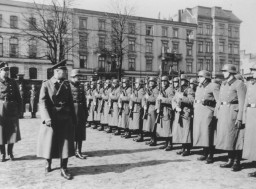
During the Holocaust, Nazi leaders required the active help or cooperation of professionals ranging from civil servants, lawyers, doctors, teachers, police, members of the military, business elites, to church leaders. Learn more.
In October 1945, the chief prosecutors of the International Military Trial brought charges against 24 leading German officials. Learn more about who was put on trial.
The Subsequent Nuremberg Trials were proceedings against leading German industrialists, military figures, SS perpetrators, and others. American military tribunals in Nuremberg, Germany, presided over the 12 trials, held between December 1946 and Apri...
The Jewish children of Lodz suffered unfolding harsh realities after the German invasion of Poland. Some of them, including Dawid Sierakowiak, recorded their experiences in diaries.
Learn more about what life was like for Holocaust survivors living in DP camps after WWII. This series focuses on DP camps in the US zone of Allied-occupied Germany.
Browse a series of articles about the role of the German military and some of its leaders during the Holocaust and World War II.
Series of resources about Anne Frank and about the experiences of children during the Holocaust.
Browse a series of articles about the 1933 book burnings in Nazi Germany, including information about the works burned and the symbolism of the book burnings.
Series of articles on the Weimar Republic (1918–1933), a liberal democratic republic founded in Germany in the aftermath of World War I.
The Nazi regime harrassed and targeted gay men and lesbians. For gay men, this harassment turned into brutal persecution. Browse these articles to learn more.
How did the United States respond to the rise of the Nazis in 1930s Germany? What did the US government know about the Nazi persecution of Jews and the “Final Solution”? Learn more
Learn about the experiences of Black people during the Holocaust and WWII, including persecution in Nazi Germany, the impact of Nazi ideology, the impact of racism on African American athletes, and the experiences of Black American soldiers.
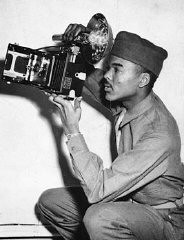
Germans in front of a Jewish-owned department store in Berlin during the anti-Jewish boycott. Berlin, Germany, April 1, 1933.
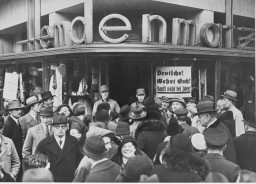
Period postcard of Evian-les-Bains, the site of the 1938 International Conference on Refugees.
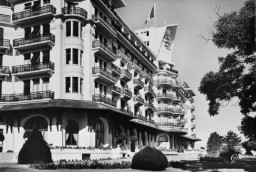
Adolf Hitler addresses an SA rally. Dortmund, Germany, 1933.
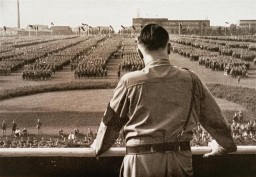
Portrait of Secretary of State Cordell Hull signing President Franklin D. Roosevelt's neutrality proclamation. September 5, 1939.
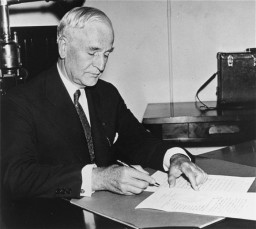
Portrait of Dr. Mohamed Helmy. Helmy was an Egyptian physician living in Berlin. He worked together with Frieda Szturmann, a local German woman, to help save a Jewish family.
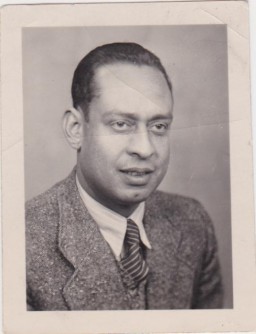
Dr. Mohamed Helmy and his wife, Emmi Ernst. During the Nazi era, they were forbidden from marrying because Dr. Helmy was not an Aryan. They were finally able to marry after the end of World War II.
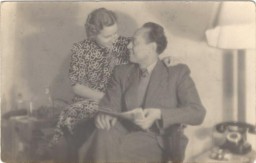
Anna Gutman (Boros) (left) and her daughter, Carla (second from left), visit with Dr. Mohamed Helmy (second from right) and his wife, Emmi (right), in Berlin in 1968. Dr. Helmy hid Gutman in his home for the duration of World War II.
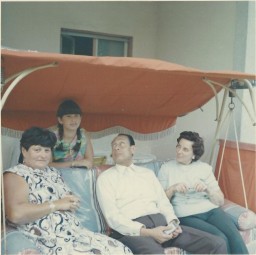
Anna Gutman (Boros) (seated, center), her daughter, and son-in-law visit Dr. Mohamed Helmy (seated, left) and his wife, Emmi (seated, right), in Berlin in 1980. Dr. Helmy hid Gutman in his home for the duration of World War II.
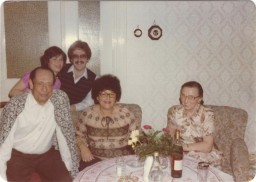
(1941-1942) Crowded newsstands in the United States such as these held journals representing various political parties and ideologies. Americans had access to many different perspectives about what was happening at home and abroad during the war.
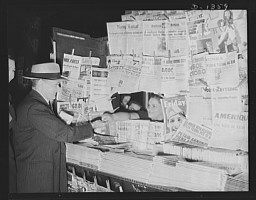
We would like to thank Crown Family Philanthropies, Abe and Ida Cooper Foundation, the Claims Conference, EVZ, and BMF for supporting the ongoing work to create content and resources for the Holocaust Encyclopedia. View the list of donor acknowledgement.